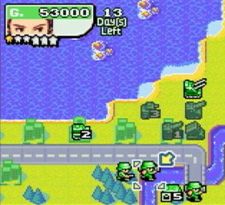How I came to like Handheld Gaming
April 17, 2006 - Games
About a year and a half before we moved to Colorado, we came out here to visit - to see how we liked it. At that time, I bought a GameBoy Advance SP to pass the time while I was out here with nothing to do. And for a long time, I used it just for that - plane rides, and other times when I was bored. I played a couple Castlevania games and old classic games like Phantasy Star, Mario Brothers, and Zelda 2. It wasn't until I played two games in particular that I really came to view handheld gaming as more than just something to do when I was bored.
 The first game I tried that I really loved was Advance Wars 2. It's a turn-based strategy which follows many of the genre's conventions. The only resources to gather are cities, which provide income, and bases which generate units using that income, but the formula really works, and the game is really engaging. Certain land, sea, and air units can only travel across certain terrains and can only attack specific types of targets. For example, submarines, bombers and battleships can't attack air units, and surface-to-air missiles can't attack anything but air units. Certain units do better damage versus ships or versus air units, and certain terrains provide a defensive cover bonus. There's just enough complexity to make it a good strategy game without becoming confusing. There are also different commanding officers to choose from, each of whom have specialties. For example, One has powerful air units, another is able to cause a blizzard which hampers the enemy's movement. If you've got a gameboy, I recommend it.
The first game I tried that I really loved was Advance Wars 2. It's a turn-based strategy which follows many of the genre's conventions. The only resources to gather are cities, which provide income, and bases which generate units using that income, but the formula really works, and the game is really engaging. Certain land, sea, and air units can only travel across certain terrains and can only attack specific types of targets. For example, submarines, bombers and battleships can't attack air units, and surface-to-air missiles can't attack anything but air units. Certain units do better damage versus ships or versus air units, and certain terrains provide a defensive cover bonus. There's just enough complexity to make it a good strategy game without becoming confusing. There are also different commanding officers to choose from, each of whom have specialties. For example, One has powerful air units, another is able to cause a blizzard which hampers the enemy's movement. If you've got a gameboy, I recommend it.
The other game, which is also a turn-based-strategy, is Fire Emblem: The Sacred Stones. Whereas Advance Wars is separated into missions, which often can be selected out of order, Sacred Stones is chapter-based, with much more storytelling. Throughout the chapters, you can often find new characters, and level them up as you go about playing, choosing for them different character classes as they level up. Halfway through, you get to choose which of the main characters to follow, effectively branching the story. Since you can only see one of the two branches, it makes for some good replayability.
 The strategy in Sacred Stones is different than that in Advance Wars. Unit types and terrain make a difference, but not as much as the weapon being used. Sacred Stones has a weapon triangle, which basically works out in a rock-paper-scissors model, with one of the three types of weapon and magic being effective against one other and weak against one other.
The strategy in Sacred Stones is different than that in Advance Wars. Unit types and terrain make a difference, but not as much as the weapon being used. Sacred Stones has a weapon triangle, which basically works out in a rock-paper-scissors model, with one of the three types of weapon and magic being effective against one other and weak against one other.
One of the things that makes both these games really work for me is the fact that they're designed for short bursts of gameplay. If something comes up and you've got to put down the game quickly, it's exceedingly easy. With Advance Wars, you can just quickly save the game at anytime, unless it's during the enemy's turn which at most would take 45 seconds to complete, and with Sacred Stones, you just shut the thing off, since it automatically saves every few seconds. That actually acts to make the game more challenging, but I love it.